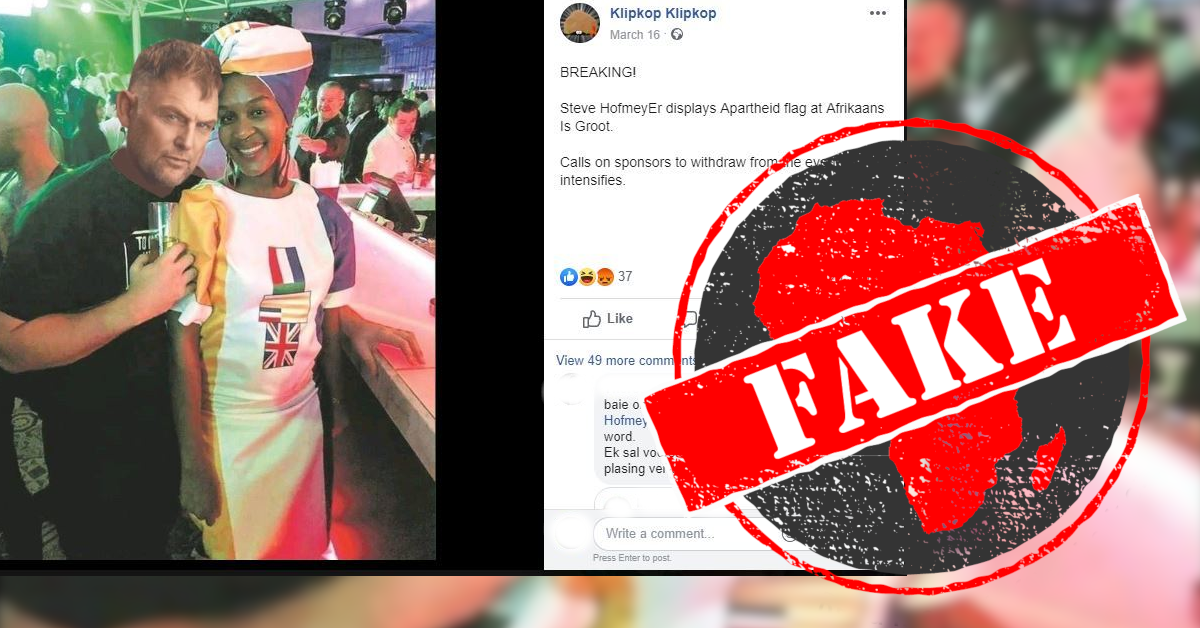A South African Facebook post from March 2019 shows a photo of what seems to be controversial Afrikaans musician and actor Steve Hofmeyr standing next to a black woman wearing a dress patterned like the apartheid-era South African flag.
Hofmeyr describes himself as a “nationalist” and “activist”. His music has recently been banned from channels on pay-TV offering Multichoice after a controversial tweet, and he has been associated with Swedish-born neo-Nazi Jonas Nilsson and right-wing British journalist Katie Hopkins.
The post reads: “BREAKING! Steve HofmeyEr displays Apartheid flag at Afrikaans Is Groot. Calls on sponsors to withdraw from the event intensifies.” Afrikaans is Groot (“Afrikaans is big”) is a South African music festival that’s also experienced recent controversy.

But the photo has clearly been manipulated, and doesn’t show Hofmeyr.
A Google reverse image search reveals that the original is from 2017, and was published in an Afrikaans-language Rapport article headlined “Misterie: Wie is die nooi in oranje blanje blou?”, which loosely translates as “Mystery: Who is the woman in the old South African flag?”
The article says the photo was taken at a year-end party hosted by the Advertising Media Association of Southern Africa. A 2017 Media Update article confirms the event.
The association’s Facebook post for the party reveals that its theme was “Nothing is taboo in the media in 2017”. Hence a black woman wearing the apartheid flag. It was even held at a nightclub called Taboo.
So the photo was taken at an Amasa party – not at the Afrikaans is Groot festival.
AFP Fact-check debunked the photoshopped image as false earlier in 2019. They say they have identified the man in the original photo to be Ruan Lottering.
They contacted Lottering, who said the woman wearing the flag dress “did it as a joke”.
“And I saw the joke about it and that's why we took the photo,” Lottering told AFP Fact-check. - Taryn Willows (31/05/19)
Hofmeyr describes himself as a “nationalist” and “activist”. His music has recently been banned from channels on pay-TV offering Multichoice after a controversial tweet, and he has been associated with Swedish-born neo-Nazi Jonas Nilsson and right-wing British journalist Katie Hopkins.
The post reads: “BREAKING! Steve HofmeyEr displays Apartheid flag at Afrikaans Is Groot. Calls on sponsors to withdraw from the event intensifies.” Afrikaans is Groot (“Afrikaans is big”) is a South African music festival that’s also experienced recent controversy.

‘Nothing is taboo’ advertising event
But the photo has clearly been manipulated, and doesn’t show Hofmeyr.
A Google reverse image search reveals that the original is from 2017, and was published in an Afrikaans-language Rapport article headlined “Misterie: Wie is die nooi in oranje blanje blou?”, which loosely translates as “Mystery: Who is the woman in the old South African flag?”
The article says the photo was taken at a year-end party hosted by the Advertising Media Association of Southern Africa. A 2017 Media Update article confirms the event.
The association’s Facebook post for the party reveals that its theme was “Nothing is taboo in the media in 2017”. Hence a black woman wearing the apartheid flag. It was even held at a nightclub called Taboo.
So the photo was taken at an Amasa party – not at the Afrikaans is Groot festival.
‘Did it as a joke’
AFP Fact-check debunked the photoshopped image as false earlier in 2019. They say they have identified the man in the original photo to be Ruan Lottering.
They contacted Lottering, who said the woman wearing the flag dress “did it as a joke”.
“And I saw the joke about it and that's why we took the photo,” Lottering told AFP Fact-check. - Taryn Willows (31/05/19)
Republish our content for free
For publishers: what to do if your post is rated false
A fact-checker has rated your Facebook or Instagram post as “false”, “altered”, “partly false” or “missing context”. This could have serious consequences. What do you do?
Click on our guide for the steps you should follow.
Publishers guideAfrica Check teams up with Facebook
Africa Check is a partner in Meta's third-party fact-checking programme to help stop the spread of false information on social media.
The content we rate as “false” will be downgraded on Facebook and Instagram. This means fewer people will see it.
You can also help identify false information on Facebook. This guide explains how.



Add new comment